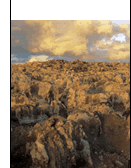

 |
|||
|
Paradise
for Sale
Newly mined areas of whitish-tan coral pinnacles contrasted starkly with the tombstone gray of oxidized coral in areas that had been mined decades ago. This aerial scene, and my previous month on Nauru, confirmed the assessment of my economist colleague, John Gowdy, and me. The Nauruans had traded their pleasant island and once-durable culture for a short-term economic gain and the devastation of their home. After gaining their independence in 1968, the Nauruans embraced a Western market approach to living. Lured by the rewards of an economic system adopted by the rest of the planet, they liquidated their natural capital by selling the phosphate ore that lay just beneath the surface of their eight-square-mile island. In return, the Nauruans gained a brief period of financial wealth, but also the immense challenges facing all of industrial civilization. Spam, potato chips, and beer replaced their diets of fresh fruit and fish and created a population plagued by obesity and diabetes. Alcoholism, cancer, stress, and technology-associated accidents became common. With only scraps of their native vegetation left, the Nauruans are now unable to feed themselves, and the phosphate that pays for their imports is almost gone. I am a biologist. Nauru is what natural scientists call a test-tube experiment, similar to those conducted on Rapa Nui (Easter Island), Mangaia, Mangareva, and a host of other islands scattered across our oceans. Their histories demonstrate clearly that human habitation, since the advent of agriculture, will inevitably deplete natural resources and lead to cultural collapse. Nauru, however, is different. It is not an illiterate, stone-age culture that failed, but rather part of a modern, technological, scientific, and economic society that ran its course to disaster. Yet, the Nauruans appear outwardly unmoved by their predicament. And we in the larger world ignore or dismiss this 100-year experiment as not being relevant to us, just as we do with other cultural histories that might guide us to durable patterns of habitation. Why isn’t our own society paying more attention? |
|
back to top |
